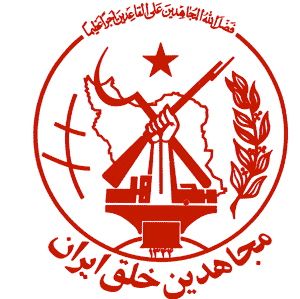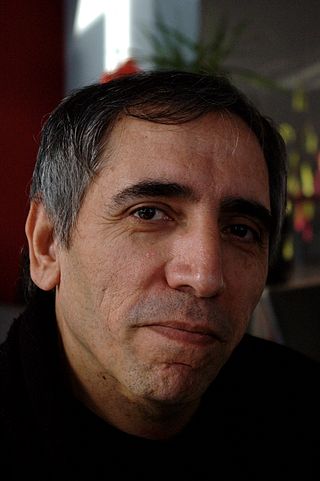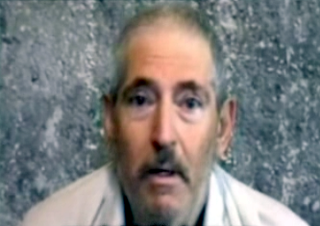Related Research Articles

Burhānuddīn Rabbānī was an Afghan politician and teacher who served as President of Afghanistan from 1992 to 1996, and again from November to December 2001.
The following lists events that happened during 2001 in Afghanistan.

The People's Mojahedin Organization of Iran (PMOI), also known as Mojahedin-e-Khalq (MEK) or Mojahedin-e-Khalq Organization (MKO) (Persian: سازمان مجاهدين خلق ايران, romanized: sâzmân-e mojâhedīn-e khalq-e īrân), is an Iranian dissident organization that was previously armed but has now transitioned primarily into a political advocacy group. Its headquarters are currently based in Albania. The group's ideology is rooted in "Islam with revolutionary Marxism", but after the Iranian revolution became about overthrowing the Government of the Islamic Republic of Iran and installing its own government. At one point the MEK was Iran's "largest and most active armed dissident group", and it is still sometimes presented by Western political backers as a major Iranian opposition group, but it is also known to be deeply unpopular today within Iran, largely due to its siding with Iraq in the Iran–Iraq War.

Mohsen Makhmalbaf is an Iranian film director, writer, film editor, and producer. He has made over 20 feature films, won 50 awards, and been a juror in more than 15 major film festivals. His award-winning films include Kandahar; his latest documentary is The Gardener and latest feature The President.

George XI, known as Gurgin Khan in Iran, was a Georgian monarch who ruled the Kingdom of Kartli as a Safavid Persian subject from 1676 to 1688 and again from 1703 to 1709. He is best known for his struggle against the Safavids which dominated his weakened kingdom and later as a Safavid commander-in-chief in what is now Afghanistan. Being an Eastern Orthodox Christian, he converted to Shia Islam prior to his appointment as governor of Kandahar.

Kandahar is a 2001 Iranian film directed by Mohsen Makhmalbaf, set in Afghanistan during the rule of the Taliban. Its original Afghan title is Safar-e Ghandehar, which means "Journey to Kandahar", and it is alternatively known as The Sun Behind the Moon. The film is based on a partly true, partly fictionalized story of Nafas, a successful Afghan-Canadian woman played by Nelofer Pazira.

Jean-Daniel Lafond is a French-born Canadian filmmaker, teacher of philosophy, and the husband to the former Governor General Michaëlle Jean, making him the viceregal consort of Canada during her service.

Ali Akbar Tabatabaei was an Iranian exile and former press attache to the Iranian embassy in the United States during the reign of Shah Mohammad Reza Pahlavi.
The "Saving Iran's Great Uprising" more commonly known as the Nojeh coup d'état, was a plan to overthrow the newly established Islamic Republic of Iran and its government of Abolhassan Banisadr and Ruhollah Khomeini.

American Fugitive: The Truth About Hassan is a film, directed by Jean-Daniel Lafond, about an exiled American political activist named Dawud Salahuddin. Belfield has confessed to assassinating a former Iranian diplomat, who supported the shah of Iran, Mohammad Reza Pahlavi, in 1980.

Fadā'iyān-e Islam is a Shia fundamentalist group in Iran with a strong activist political and terrorist orientation. The group was founded in 1946, and registered as a political party in 1989. It was founded by a theology student nicknamed Navvab Safavi. Safavi sought to purify Islam in Iran by ridding it of 'corrupting individuals' by means of carefully planned assassinations of certain leading intellectual and political figures.

The 1977 Hanafi Siege was a terrorist attack, hostage-taking, and standoff in Washington, D.C., lasting from March 9 to March 11, 1977. Three buildings were seized by twelve Hanafi Movement gunmen, who took 149 hostages. During the initial attack and takeover of the buildings, a journalist and a police officer were killed, and three others, including a city councilor, were injured. After a 39-hour standoff, the gunmen surrendered and all remaining hostages were released.

Robert Alan "Bob" Levinson was an American former Drug Enforcement Administration (1970–1976) and Federal Bureau of Investigation (1976–1998) agent who disappeared on March 9, 2007, in Kish Island, Iran, while on a mission for the Central Intelligence Agency (1998–2007). Levinson's family received a $2.5 million annuity from the CIA in order to stop a lawsuit revealing details of his work in Iran and to forestall any revelation of details regarding the arrangement between Levinson and the agency.
Since the Iranian Revolution in 1979, the government of Iran has been accused by several countries of training, financing, and providing weapons and safe havens for non-state militant actors, such as Hezbollah in Lebanon, Hamas in Gaza, and other Palestinian groups. These groups are designated terrorist groups by a number of countries and international bodies; however, Iran considers such groups to be "national liberation movements" with a right to self-defense in the face of Israeli military occupation.
Tabatabaei is a surname denoting descent from someone called Tabataba, in particular Ismail bin Ibrahim Al-Ghamr ibn Hasan ibn Hasan, a great-grandson of Ali, the fourth and last of the Rightly Guided Caliphs. It is one of many families of Sayyid Shia Muslims, predominant in Iran, but also in Iraq, Lebanon, Kuwait and Pakistan.
Hamaas Abdul Khaalis, born Ernest Timothy McGhee, was leader of the Hanafi Movement, a Black Muslim group based in Washington, D.C..

On 11 October 2011, United States officials alleged there was a plot tied to the Iranian government to assassinate Saudi ambassador Adel al-Jubeir in the United States. The plot was referred to as the "Iran assassination plot" or the "Iran terror plot" in the media, while the Federal Bureau of Investigation named the case "Operation Red Coalition". Iranian nationals Manssor Arbabsiar and Gholam Shakuri were charged on 11 October 2011 in federal court in New York with plotting to assassinate Al-Jubeir. According to U.S. officials, the two planned to kill Al-Jubeir at a restaurant with a bomb and subsequently bomb the Saudi embassy and the Israeli embassy in Washington, D.C. Bombings in Buenos Aires were also discussed. Arbabsiar was arrested on 29 September 2011 at John F. Kennedy International Airport in New York while Shakuri remained at large. On 24 October 2011, Arbabsiar pleaded not guilty. In May 2013, after pleading guilty, Arbabsiar was sentenced to 25-years imprisonment.
The Egyptian Islamic Jihad, formerly called simply Islamic Jihad and the Liberation Army for Holy Sites, originally referred to as al-Jihad, and then the Jihad Group, or the Jihad Organization, is an Egyptian Islamist group active since the late 1970s. It is under worldwide embargo by the United Nations as an affiliate of Al-Qaeda. It is also banned by several individual governments worldwide. The group is a proscribed terrorist group organization in the United Kingdom under the Terrorism Act 2000.

Seyyed Abdollah Behbahani was a Shi'a theologian and a prominent leader of the constitutional movement. He was born in Najaf and was educated by scholars such as Morteza Ansari. During the constitutional movement he was influential in the Majlis. On the night of 15 July 1910, four gunmen attacked his house and killed him. Seyyed Hassan Taghizadeh was suspected to be responsible, and he subsequently fled the country.

Liwa Dawud was an armed group in the Syrian Civil War headquartered in Samrin in the Idlib Governorate and originated as a subunit in Suqour al-Sham then later became an independent faction then joined the Jaysh al-Sham coalition until 2014 when the group along with its leader defected to the Islamic State of Iraq and the Levant during the course of the Inter-rebel conflict during the Syrian Civil War.
References
- 1 2 Michael Taylor, "'Kandahar' Actor Accused of Being Assassin: Tantai Said to Have Killed Diplomat", San Francisco Chronicle, January 4, 2002.
- ↑ Benjamin Nugent. With reporting by Azadeh Moaveni/Tehran (December 19, 2001). "A Killer in "Kandahar?"". Time. Archived from the original on February 8, 2002. Retrieved November 21, 2008.
- 1 2 Silverman, Ira (July 29, 2002). "An American Terrorist". The New Yorker . Retrieved April 28, 2021.
- ↑ Isikoff, Michael (2013). "Last man to see Robert Levinson before he vanished denies involvement in disappearance". NBC News. Retrieved April 28, 2021.
- ↑ Oct 2011 The last alleged Iranian assassination plot on U.S. soil was a success
- 1 2 American Fugitive:The truth about Hassan Archived December 8, 2008, at the Wayback Machine , InformAction
- 1 2 3 4 5 6 7 8 9 10 An American Terrorist: He's an assassin who fled the country. Could he help Washington now?, The New Yorker, August 5, 2002
- 1 2 3 4 5 6 Robert, Mackey (September 16, 2009). "Just Another American Hit Man, Actor and Journalist Living in Iran". The New York Times . Retrieved April 28, 2021.
- 1 2 "2 Americans believed detained in Iran are not among those coming home". The Washington Post.
- 1 2 3 4 5 Trento, Joseph (March 22, 2006). Prelude to Terror: Edwin P. Wilson and the Legacy of America's Private Intelligence Network . Basic Books. pp. 183. ISBN 978-0786717668.
- ↑ Mackey, Robert (September 16, 2009). "Just Another American Hit Man, Actor and Journalist Living in Iran". The New York Times. Retrieved February 17, 2013.
- 1 2 3 Pear, Robert (July 17, 1981). "Four Indicted in '80 Murder of Iranian Press Aide". The New York Times . ISSN 0362-4331 . Retrieved April 28, 2021.
- ↑ Actor or assassin? by Fiachra Gibbons The Guardian, January 10, 2002
- ↑ Lafond's new film hits hot buttons, CBC , April 26, 2006
- ↑ Kandahar film's murder mystery December 30, 2001
- ↑ "US pushes for release of Americans in direct talks with Iran". The Times of Israel . April 28, 2017. Retrieved April 29, 2017.
- ↑ The condemned January 11, 2002
- ↑ Airbrushing a killer Archived December 10, 2009, at the Wayback Machine , National Post , May 2, 2006